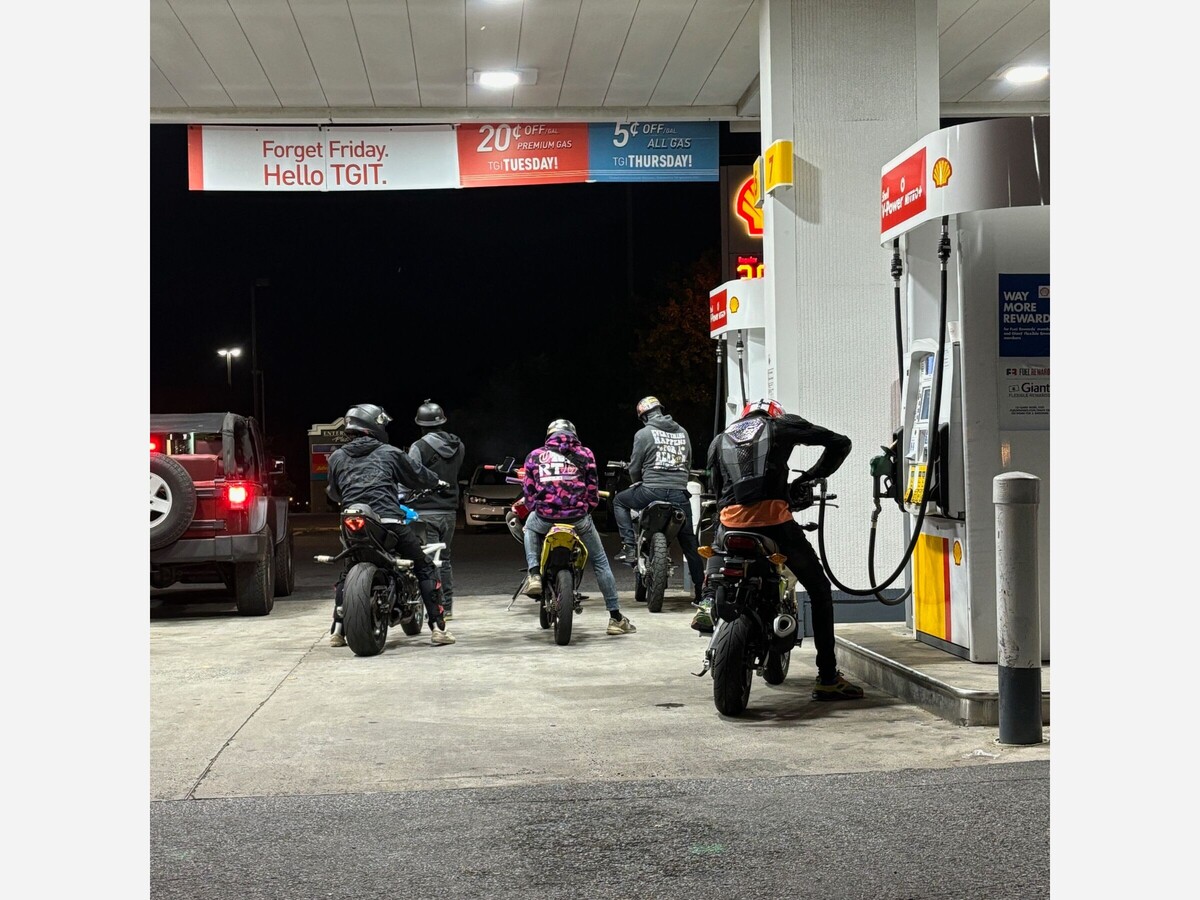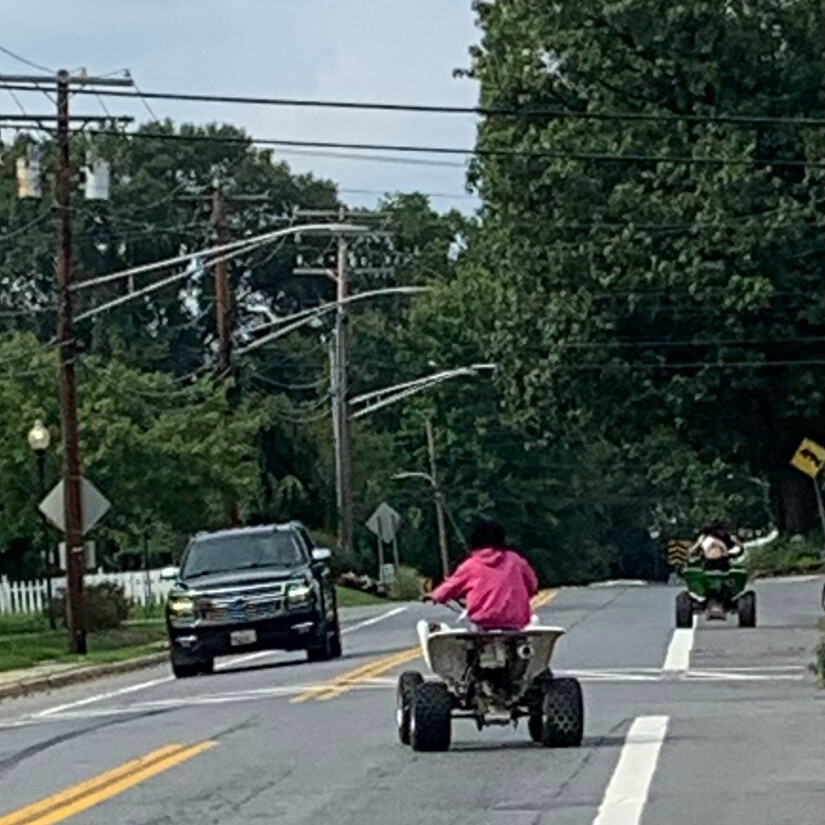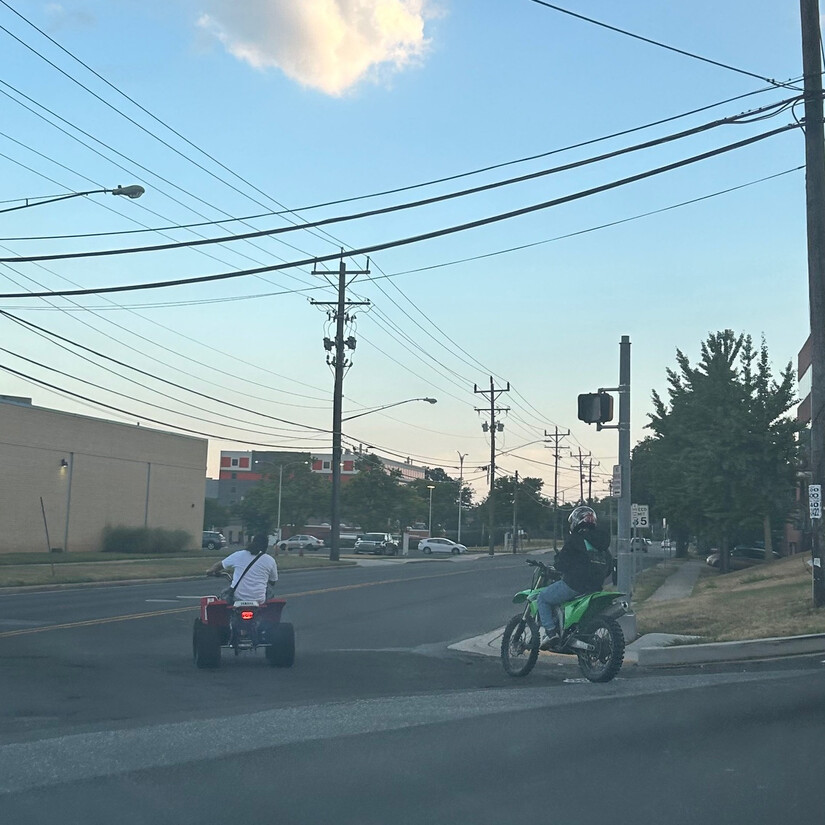Image


By Ariyana Griffin
Urban dirt biking on city streets has been an outlet for thousands of riders across the country, creating a form of recreation, strong bonds among riders and sometimes clashes with police.
Rolling past drivers on gas-powered bikes and all-terrain vehicles, dirt bikers from Baltimore to Cleveland have been known to perform daredevil stunts, record videos while riding and weave in and out of traffic.
It is a risky unofficial sport, but one that is growing in popularity in Maryland and fueling a sense of freedom for bikers brave enough to start their engine.
But no matter how thrilling and carefree it may seem, dirt biking on the open road is an illegal mode of transportation, according to Maryland state law.
The growing dirt bike activity in the state sparked a hearing in the Maryland General Assembly last year. Throughout the summer, urban dirt bikers were observed across Prince George’s County, from Bowie to Beltsville, and in Washington, D.C.
The culture was documented in the 2013 documentary, “12 O'Clock Boys” that follows a youth in West Baltimore as he discovers his reasoning for wanting to be a part of the biker community. The film highlights the culture of riding, which started in the 1960s with neighborhood youth and ultimately became part of their identity.
A spike in illegal dirt bike riding in Maryland has resulted in a crack down on the hobby, with police dispersing tickets and fines, seizing bikes, issuing warrants and making arrests.
The State's Attorney for Baltimore City and the Baltimore Police Commissioner announced an effort in April to keep dirt bikes off the streets, claiming that riders can potentially endanger pedestrians, drivers and the other riders.
Not only that but, according to Baltimore city officials, they can harm themselves – as riders often participate in reckless stunts and operate bikes without protective gear. According to a study conducted by MX Gear in 2024, the most common injuries resulting from the activity are broken and sprained ankles and wrists, head injuries and concussions, broken collarbones, ACL tears and shoulder injuries such as radiator cuff tears.
"Illegal dirt bike riding endangers pedestrians, drivers, and the riders themselves," State's Attorney for Baltimore City Ivan J. Bates said in a press release earlier this year. "It's imperative that we crack down on every individual enabling illegal dirt bike riding to persist in our city and uplift those organizations, like B360, that provide alternatives to riders. This increased enforcement directly responds to calls from our residents and communities and is ultimately about safety in Baltimore."
Baltimore city officials say the law applies to everyone, including businesses that provide services for riders. Owners will also be fined up to $1,000 per a third offense. Parents of minors will have to take parenting courses for the child's first offense, and further offenses will result in monetary punishment.
 A pair of dirt bikers ride through historic Old Bowie in Maryland on Aug. 5, 2023. Catherine Hollingsworth/The Bowie Sun
A pair of dirt bikers ride through historic Old Bowie in Maryland on Aug. 5, 2023. Catherine Hollingsworth/The Bowie SunSome riders say they have experienced harassment from police due to the recent activity, and have sought ways to prevent this from happening.
We have granted several bike riders anonymity in order to include their stories. They fear reprisal from the police, who they say have a history of harassment.
A source from Prince George’s County said he has been riding since he was eight years old. “I was brought up and raised around them, seeing them all my life. I finally got a little bike up that wasn't running and started working on it. I got it running,” he said.
Growing up he did not have anywhere to ride except for the streets, which eventually resulted in his bike being confiscated. He also said he endured surveillance and harassment. He said that riders have gathered in off-road secluded areas to ride and still fell into trouble with the law.
Participating in legal competition and engaging in lawful riding can create expenses many youth say they can’t cover. Local track competitions require participants to pay entry fees as well as purchase proper gear, which can cost thousands, making it unsuitable for everyone to participate, they say.
“You got to have money to pay,” he said. “You have to have equipment, people don't always have the money to get the equipment you need to ride on tracks. You have to have a neck brace, boots and a helmet and all that.”
Bikes cost thousands and when police confiscate them, due to illegal riding, riders endure financial setbacks, he said.
The Prince George’s County resident lived in Bowie at the time when the police produced a warrant to search the garage at his mother’s house. He said he was never shown a warrant before police confiscated three bikes.
“They didn't show me no warrant in my face,” he said. “They held the bike for maybe three days then called me back and said you can come to the impound, get your bikes back but 2000 dollars a piece, which would have been two, four, six thousand dollars to get three bikes back.”
That was a price too steep for him to pay. Others say the state should provide alternatives.
 Two bikers take off riding at Sunnyside Avenue in Beltsville, Maryland. The biker on the right is seen recording the ATV rider on July 6, 2024. Catherine Hollingsworth/The Bowie Sun
Two bikers take off riding at Sunnyside Avenue in Beltsville, Maryland. The biker on the right is seen recording the ATV rider on July 6, 2024. Catherine Hollingsworth/The Bowie SunB360 serves as a potential solution to the Baltimore community’s needs. It is an organization founded by Brittany Young, a Baltimore native, who sides with bikers. She’s lobbied for change and received grant funds to operate programs to offer alternatives to illegal bike riding.
Maryland Senators have invested $3 million to build the nation's first dirt bike park in Baltimore, ultimately looking to create another solution to the problem.
“B-360 utilizes dirt bike culture to end the cycle of poverty, disrupt the prison pipeline, and build bridges in communities,” the organization states on its website. “Through STEM education, community engagement, career preparation, and events, we equip youth and young adults with the skills to secure educational and career opportunities, while changing the negative perception of dirt bike riders.”
B-360 holds several events throughout the year allowing adult riders from the community to serve as instructors for the younger population. They host camps as well as participate in school’s after school programs to help children create a positive outlet while learning the proper safety needed to participate in dirt bike riding. According to Young they have hired over 65 former street riders and helped aid in 75% decrease in confiscated dirt bikes from 2018 to 2013.
“I wanted to make sure that no matter if it was dirt bikes, whether it was science, that we found ways to engage young people and to show the best and brightest of Baltimore,” she said. “Because sometimes we have a bad narrative where there's so much positivity here and with the organization.”
She shared that the organization is working towards securing a permanent campus.
“These next 18 to 20 months, I'll be raising close to $20 million to make sure it's a campus,” Young said.
Freelance writer Ariyana Griffin is studying journalism at Morgan State University. Catherine Hollingsworth contributed reporting.
For more information about the nonprofit B360, read about their work in The Bowie Sun recommendations.
This article was made possible with funding from the Solutions Journalism Network and may be republished through the network’s story tracker.